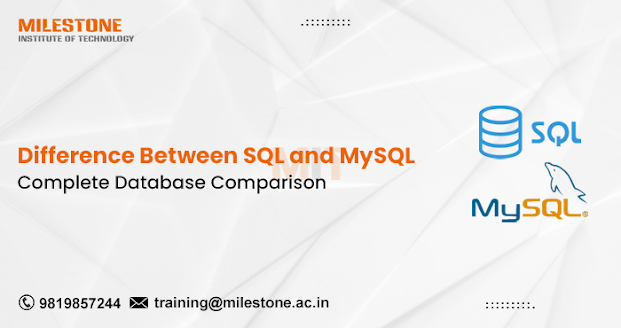Understanding Difference Between SQL and MySQL : Complete Database Comparison
In the realm of database management systems (DBMS), SQL and MySQL are often mentioned interchangeably, leading to confusion among beginners and even seasoned professionals. While SQL (Structured Query Language) is a standard language for managing and manipulating relational databases, MySQL is one of the most popular relational database management systems. Understanding the nuanced difference between SQL and MySQL is crucial for making informed decisions in database development and management. Let's delve into a comprehensive comparison to elucidate their disparities.
SQL: A Programming Language
SQL, or Structured Query Language, serves as a universal language for interacting with relational databases. It provides a standardized syntax for executing operations such as querying data, updating records, inserting new data, and deleting existing data. SQL is not tied to any specific database management system but rather serves as a framework for communicating with various relational databases.
SQL adheres to the ANSI (American National Standards Institute) and ISO (International Organization for Standardization) standards, ensuring consistency and interoperability across different database platforms. This means that SQL commands and syntax remain consistent irrespective of the underlying database system.
MySQL: A Popular Relational Database Management System
MySQL, on the other hand, is a specific implementation of a relational database management system. Developed by Oracle Corporation, MySQL is open-source and widely used for web applications and other data-driven projects. It supports SQL as its querying language, making it compatible with a vast ecosystem of SQL-based tools and frameworks.
MySQL offers a robust set of features, including support for multiple storage engines, replication, transactions, triggers, and stored procedures. Its scalability, performance, and ease of use have contributed to its widespread adoption across industries.
Key Differences Between SQL and MySQL
1) Ownership and Licensing: SQL is a language specification, whereas MySQL is a specific relational database management system. SQL is not owned by any single company and is open for implementation by multiple vendors. MySQL, however, is owned by Oracle Corporation, which acquired it through the purchase of Sun Microsystems in 2010. While MySQL Community Edition is open-source and free to use, Oracle also offers a commercial version with additional features and support.
2) Implementation and Variants: SQL serves as a standard language implemented by various relational database management systems such as MySQL, PostgreSQL, SQLite, Microsoft SQL Server, and Oracle Database. Each of these systems may have its own extensions and proprietary features while adhering to the core SQL syntax. MySQL, on the other hand, is a specific implementation of a relational database management system, which means it includes additional functionalities beyond what SQL defines.
3) Features and Capabilities: MySQL offers a comprehensive set of features tailored for managing relational databases, including support for ACID (Atomicity, Consistency, Isolation, Durability) transactions, indexing, replication, and security features. SQL, being a language specification, does not inherently provide these features but rather defines the syntax and semantics for executing database operations. However, SQL-compatible database management systems like MySQL often extend SQL with additional features and optimizations.
4) Community and Ecosystem: Both SQL and MySQL have vibrant communities that contribute to their development and support. SQL benefits from being a standard language implemented by multiple database systems, fostering a broad ecosystem of tools, libraries, and resources. MySQL, with its large user base and active community, offers extensive documentation, forums, and user groups for assistance and collaboration.
Conclusion
In conclusion, while SQL serves as a standardized language for interacting with relational databases, MySQL is a specific implementation of a relational database management system that supports SQL. Understanding the nuances between SQL and MySQL is essential for leveraging their respective strengths and building robust, efficient database solutions. Whether you're a beginner or a seasoned database professional, clarity on these differences will empower you to make informed decisions in database development and management.

.png)


Comments
Post a Comment